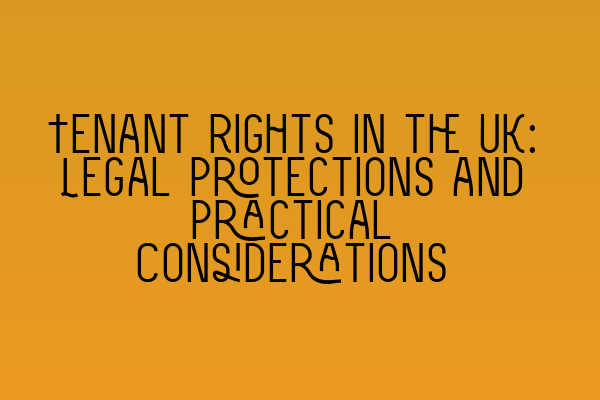Tenant Rights in the UK: Legal Protections and Practical Considerations
As a tenant in the UK, understanding your rights and legal protections is crucial to ensuring a fair and satisfactory tenancy. With the complexities of property law, it is important to have the knowledge and guidance necessary to navigate your rights as a tenant. In this article, we will explore the legal protections in place for tenants in the UK and offer practical considerations to help you make the most of your tenancy.
1. Understanding Tenancy Agreements
The first step in protecting your rights as a tenant is to thoroughly read and understand your tenancy agreement. A tenancy agreement is a legally binding contract between you and your landlord that sets out the terms and conditions of your tenancy. It is important to pay close attention to key clauses such as rent amount, tenancy duration, notice periods, and maintenance responsibilities.
To gain a comprehensive understanding of contractual capacity, its rights, and limitations, check out our article on Understanding Contractual Capacity: Rights and Limitations. This will help you grasp the legal competence of contracting parties and ensure that your tenancy agreement aligns with your rights as a tenant.
2. Security of Tenure
In the UK, tenants have the right to security of tenure, which means that you have the right to stay in your rented property for a fixed period of time. The length of your tenancy will depend on the type of tenancy agreement you have, such as an assured shorthold tenancy or a periodic tenancy.
However, it is important to note that security of tenure can be affected by certain circumstances, such as rent arrears, anti-social behavior, or landlord’s intention to sell the property. It is crucial to be aware of these potential pitfalls and ensure that your rights to security of tenure are protected.
3. Rent Increases and Rent Reviews
As a tenant, you have the right to be informed of any rent increases or rent reviews by your landlord. Your tenancy agreement should clearly state how and when your rent may be increased. It is important to check that any proposed rent increase is in line with market rates and that your landlord follows the proper procedures for notifying you.
In some cases, you may be able to negotiate the terms of a rent increase with your landlord. However, it is important to be aware that there are legal limitations to rent increases, and your rights as a tenant may provide some protection against excessive rent hikes.
4. Repairs and Maintenance
One of the key responsibilities of a landlord is to ensure that the property is safe and habitable. Your tenancy agreement should clearly outline the responsibilities of both parties when it comes to repairs and maintenance. It is important to promptly report any issues to your landlord and keep a record of all correspondence.
If your landlord fails to carry out necessary repairs, you may be entitled to take legal action. However, it is advisable to seek legal advice before pursuing any legal action to understand your rights and options.
For interactive SQE mock tests for contract law and to test your knowledge on various legal topics, we invite you to check out our article on Interactive SQE Mock Tests for Contract Law: Test Your Knowledge. This will provide you with valuable insights and help you assess your understanding of important legal concepts.
5. Deposit Protection
In the UK, landlords are required to protect your tenancy deposit in a government-approved deposit protection scheme. This is to ensure that your deposit is not unfairly withheld at the end of your tenancy. It is important to check that your deposit has been protected and to familiarize yourself with the procedures for disputing any deductions.
6. Evictions and Notice Periods
If your landlord wishes to evict you, they must follow the proper legal procedures and provide you with the appropriate notice period. The notice period will depend on the type of tenancy agreement you have and the reason for eviction. It is important to be aware of your rights in the event of an eviction and seek legal advice if necessary.
For expert insights and guidance on contract law and other legal topics, consider joining our SQE Contract Law webinars. These webinars offer valuable knowledge and support to help you navigate the complexities of property law. Learn more about our webinars by visiting Join Our SQE Contract Law Webinars: Expert Insights and Guidance.
7. Discrimination and Harassment
As a tenant, you have the right to be treated fairly and without discrimination or harassment. Discrimination on the grounds of religion, race, gender, disability, or other protected characteristics is illegal. If you believe you have been subjected to discrimination or harassment by your landlord, it is important to seek legal advice and pursue appropriate action.
8. Seeking Legal Advice
While this article provides a general overview of tenant rights in the UK, it is important to remember that every tenancy is unique. If you have any concerns or need specific advice about your rights as a tenant, it is advisable to seek legal advice from a qualified solicitor specializing in property law.
For comprehensive preparation on contract law and to master the essentials of this area, we recommend checking out our article on SQE Prep: Mastering the Essentials of Contract Law. This resource will help you build a strong foundation in contract law and enhance your understanding.
In conclusion, understanding your rights as a tenant in the UK is crucial for a smooth and satisfactory tenancy. By familiarizing yourself with your tenancy agreement, understanding security of tenure, being aware of rent increases and repairs, protecting your deposit, knowing eviction procedures, and seeking legal advice when necessary, you can better protect your rights as a tenant. Remember to stay informed and proactive to ensure a fair and mutually beneficial tenancy experience.
